
 Flash News
Flash News
Requesting conditional release, Ervin Salianji arrives at the Fier Court
Fire in Lura, flames endanger the National Park
International drug search: 36-year-old arrested in Durrës (NAME)
Veliaj's appeal to be heard today in the High Court
Today's hearing at the Fier Court, Salianji requests conditional release

The Committee for Economy and Finance discussed on Thursday without result the amendments to the law "On games of chance", which foresees their return online five years after the "Rama" government closed them by law.
In an online meeting with the presence of only the deputies of the majority, a consensus was not reached on the new changes proposed for the government draft by the chairman of the commission, Eduart Shalsi.
From the start, Shalsi admitted that these changes do not solve the challenge of managing this market, asking the Ministry of Finance to draft a new, more complete law.
The first proposal was related to the way the competition was organized by setting an extra fee for companies winning licenses to organize these games.
"Since the license will be for 10 years, the competition should be organized in two stages, an initial competition with basic completion of legal documents and the second stage to have a financial component," Shalsi said, clarifying that the criterion should be "who invests more" with the idea of a floor auction.
The second proposal was related to the construction of a system that will leave a trace of all transactions that will take place in online gaming and sports betting companies.
"There is a concession that will remain in force, but it is suggested that this type of system, including monitoring, be monitored in real time on a record," he added.
He admitted that the commission had received numerous proposals and one of them was the request from the former betting companies that activity in 3 foreign countries should not be a disqualifying condition, but a minimum of years in this field. This request was not accepted and Shalsi clarified that the commission will stick to the definition of the criterion that the company has no less than 3 years of experience in this field in the 3 OECD countries.
According to him, the percentage of shares that the foreign shareholder will have will have to be determined according to local legislation, which is another limiting criterion.
Deputy Erion Braçe, who opposed this draft law from the start, also opposed the new proposals, saying that, "what is proposed is to release it without hands at all, to spread it everywhere".
"Do we want to legalize it and control it or are we just legalizing it and letting it go free"? asked Braçe, finding that the law has no measures to control it. Braçe proposed that the online betting platform be state-owned and monopolized as the only way to control illegal activity.
Even other socialist MPs criticized the government's project and continued to insist that the tax on the companies that will be licensed is zero, questioning the benefit of the state.
"They cannot pay less taxes than those who exercise commercial activity," said Alban Xhelili, calling the anticipated tax "unfair".
He also spoke about the risk of manipulation, referring to consultations with representatives of betting companies. According to Xhelil, these lack of guarantees on their platforms can lead to evasion, but also to elements of money laundering.
Even MP Pranvera Resulaj asked for a higher tax for betting companies.
After the debates, Shalsi admitted that 100 percent formalization of the market could not be claimed, but at least the changes aim to legalize the illegal market that is currently there.
The opposition has also strongly opposed this government draft law. Democratic MP Jorida Tabaku told BIRN that even the new changes proposed on this draft do not change the perception that it is a "clientelistic law".
"The government continues the tradition of custom and clientelistic laws," said Tabaku, describing the changes as "favoring a minority, punishing the majority and deepening inequality both in the sense of taxing these businesses and in establishing rules."
"There is still no clarity on how to operate with foreign companies that must be partners with Albanian ones," she emphasized, adding that, "these ambiguities create serious problems, considering that most of the contracts that SPAK is testing as corrupt and has investigated them had foreign companies"./ BIRN
Latest news


Requesting conditional release, Ervin Salianji arrives at the Fier Court
2025-07-08 11:16:36
The first phase of university applications begins today
2025-07-08 11:10:52
Fire in Lura, flames endanger the National Park
2025-07-08 10:53:43
Trump warns of 35% tariffs on Serbia and 30% on Bosnia and Herzegovina
2025-07-08 10:37:32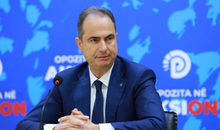
Thethi rooster and the dung cock
2025-07-08 10:24:01

Fire in Dukat endangers Llogara National Park
2025-07-08 10:01:39
International drug search: 36-year-old arrested in Durrës (NAME)
2025-07-08 09:50:48
Thethi, tourists "criticize" modern trend
2025-07-08 09:39:54
Fire on Mount Dukat still active, Llogara National Park at risk
2025-07-08 09:28:12
Veliaj's appeal to be heard today in the High Court
2025-07-08 09:16:02
"Bad sign for democracy"/ Parliament neglects reporting by institutions
2025-07-08 09:04:56
Today's hearing at the Fier Court, Salianji requests conditional release
2025-07-08 08:56:39


Horoscope, what do the stars have in store for you today?
2025-07-08 08:16:19
Weather forecast/ How temperatures will vary throughout the day
2025-07-08 08:02:37
Morning Post/ In 2 lines: What mattered yesterday in Albania
2025-07-08 07:48:30





Marrëdhënia që s’është romancë, por s’është as thjesht kolegiale
2025-07-07 21:39:13
Citizen is asked to pay 2.5 million for a non-existent meter
2025-07-07 21:28:03




What is the ideal air conditioner temperature in summer?
2025-07-07 20:53:46
GJKKO left him in prison, Meta appeals the decision
2025-07-07 20:38:05
Where is Ronaldo after missing Diogo Jota's funeral?
2025-07-07 20:38:04

Messages from the author who killed Ilaria Sulla in Rome are revealed
2025-07-07 20:20:12
At least 91 dead in Texas floods
2025-07-07 20:12:02
Elbasan, choked by smoke, scorched by conscience
2025-07-07 19:48:16

Swarm of bees attacks citizens in France, 24 people end up in hospital
2025-07-07 19:32:03
Dementia/Hearing loss may be a warning sign
2025-07-07 19:13:06
The decision for Malltez, Gjokutaj: Boomerang for SPAK and the Court
2025-07-07 19:01:08

Former Supreme Court member acquitted of asset concealment
2025-07-07 18:36:40

WIIW expert in Politiko: Brain drain is steadily weakening the Albanian economy
2025-07-07 18:11:41
Heart health is at risk from extreme heat, here's what you should be careful of
2025-07-07 18:10:18
Today Gert Bogdani would celebrate, Edlira Çepani's touching dedication
2025-07-07 17:40:45






The striker severely accuses the Fenerbahce club: They tried to drug me
2025-07-07 16:21:03
A decomposed body is found in Kolonjë, initial suspicions
2025-07-07 16:03:31
Accident in Saranda, car hits motorcycle, one injured
2025-07-07 15:58:56

The most fertile age for men and women
2025-07-07 15:40:52
Locals, Rama candidate in 5 municipalities
2025-07-07 15:32:22
Blushi: Meta's criminal kidnapping, incomparable even to Navalny's in Russia
2025-07-07 15:20:34
Meet the iPhone 17 Pro, the main innovations in design and technology
2025-07-07 15:09:09
Why the release of Abi Malltez does not free him; much less Albania
2025-07-07 15:00:12
‘Lidhjet klienteliste’ të mjekëve mbushin recetat e pacientëve
2025-07-07 14:57:33
Poland imposes border controls with Germany and Lithuania
2025-07-07 14:48:15

Caught transporting firearms from Kosovo to Albania, young man arrested (NAME)
2025-07-07 14:37:47
Theo Hernandez flies to Saudi Arabia for medical check-ups
2025-07-07 14:26:47


Scorching heat, Greece orders mandatory work holidays
2025-07-07 13:54:25


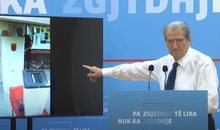

Trump expects Netanyahu to discuss Gaza ceasefire
2025-07-07 12:54:27

GJKKO releases Jamarbër Malltezi from house arrest
2025-07-07 12:35:02
Tourism among contrasts
2025-07-07 12:31:01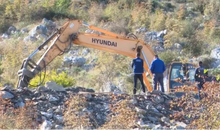
IKMT action in Theth, starts demolition of unauthorized constructions
2025-07-07 12:24:18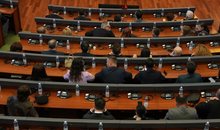

The Tirana-Kamëz line is destroyed by urban fire
2025-07-07 12:00:24




Poor direction!
2025-07-07 11:16:01


Rama to gather the country's mayors on July 9
2025-07-07 10:43:31
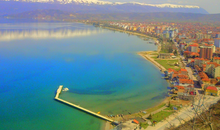
Ohrid Natural Park on the way to UNESCO's "black list"
2025-07-07 10:25:58

Registrations for the new school year begin in e-Albania
2025-07-07 09:59:09
KAS decides the "fate" of the elections in four districts of the country today
2025-07-07 09:50:51
Rama does not give up on Vlora, visits the municipality again
2025-07-07 09:39:11


Fires in Gjirokastra, flames very close to cultural monuments
2025-07-07 09:12:49

